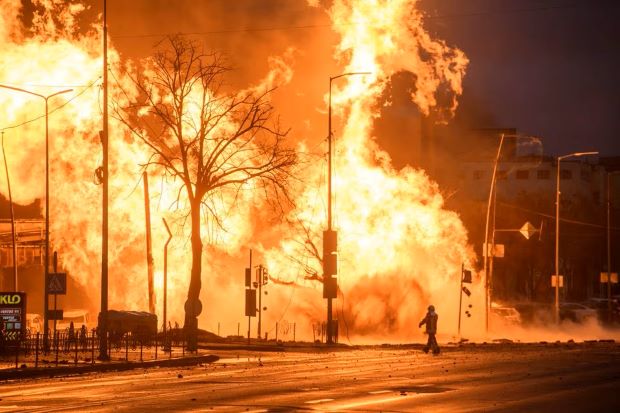Russia hammers Kyiv with missiles in large-scale attack
By Constant Méheut
KYIV — Russian missiles and drones hammered Kyiv on Tuesday (2) morning, officials said, in a large-scale attack on the Ukrainian capital and other cities, the day after President Vladimir Putin of Russia promised to retaliate for a Ukrainian assault on a Russian city.
The Ukrainian air force said the barrage involved some of Russia’s most powerful weapons, including hypersonic missiles that fly at several times the speed of sound. Air-raid alerts sounded constantly in Kyiv on Tuesday morning, as wave after wave of missiles rained down.
One person in the city, an older woman, died in the attack, and 43 people were injured, including two children, according to Vitali Klitschko, the city’s mayor. Two others were killed in the Fastiv region near Kyiv, Ukraine’s interior minister, Ihor Klymenko, said in a post on Telegram.
Loud bangs jolted the capital as its air defence systems tried to shoot down the missiles. Massive plumes of black and white smoke rose throughout the city, cutting through the grey early morning sky, as several buildings were hit.
Klitschko said debris from intercepted strikes had caused fires in several areas and that power had been cut off from several residential buildings and other facilities. Klitschko added that a large warehouse had caught fire and that at least 16 people had been injured after a high-rise building was hit.
Kharkiv, Ukraine’s second-largest city and near the border with Russia, also came under a large-scale missile attack, according to Oleh Syniehubov, the head of the regional military administration there. At least one person was killed there and 41 were injured, he said.
The attacks were launched hours after Putin had vowed to respond to what Moscow said were Ukrainian strikes Saturday (Dec 30) that killed 24 people in the Russian city of Belgorod. “From our side, we will build up the strikes,” Putin said on Monday (Jan 1).
The attack on Belgorod, according to a Ukrainian official, was in response to a Russian missile barrage the day before, one of its largest air attacks of the nearly two-year-old war. That assault on Friday (Dec 29) killed at least 39 people, wounded about 160 others and hit critical industrial and military infrastructure as well as hospitals and schools, Ukrainian authorities said.
Ukrainian authorities had warned for months that Russia was likely to pound Ukrainian cities and target their infrastructure once the weather turned cold, in a repeat of last year’s winter campaign against the energy grid. Those assaults plunged Kyiv into cold and darkness in the winter months.
It was not immediately clear what, exactly, the Russian military was specifically trying to hit Tuesday. But in the centre of Kyiv, white smoke billowed near a thermal plant that has been targeted in the past, and local authorities reported damage to a water supply system in one neighbourhood.
In Kyiv, most of the casualties were reported at a nine-floor residential building that was damaged and caught fire. Residents of the building could be seen streaming out of the neighbourhood Tuesday morning, bags in hand, stepping onto piles of rubble and into large puddles caused by damage to water pumps.
A man tried to rush past a line of police officers, yelling that his wife was still in the building, possibly lying under the rubble. On a nearby street, two people ran after an ambulance, screaming that a woman needed urgent care. After the ambulance stopped, they helped a woman get inside.
“Oh my god, oh my god,” the woman said before entering the ambulance.
Coming down the stairs of the residential building, which were strewn with debris and shards of glass, Lidiia Dudchenko, 71, said, “There was an explosion and it was a miracle we survived. I have never experienced anything so terrible.”
On each of the nine stories, the same scene was visible again and again: doors smashed by the blast and debris of furniture everywhere on the floor. Police officers were entering the apartments trying to determine whether some residents had been trapped under the rubble.
On one floor, pillows and blankets were laid in a corridor, covered with debris. Ukrainians often take shelter in the corridor of their homes during air assaults, using the walls to protect themselves from blasts.
In another apartment, Yevhen Pesiura, 40, was packing clothes and precious belongings in a suitcase, shards of glass cracking under his feet. He said he was with his wife and two daughters when the building was hit.
“I can’t live there anymore,” he said, pointing at his destroyed apartment.
Over the past year, Ukraine has received powerful air defence systems from its allies, including Patriot surface-to-air missile batteries, which have proved successful at repelling many Russian attacks.
Though Ukraine is well supplied with Western weapons, the surface-to-air missiles that are needed to intercept Russian missiles are in short supply. And with a front line more than 600 miles long, important air defences need to be evenly distributed to protect Ukrainian troops from Russian attack helicopters and jets.
This has left Ukrainian forces in a difficult position as they juggle resources, trying to ensure that the front line and major cities such as Kyiv, Kharkiv, Dnipro and Lviv have sufficient supplies for their defences.
Ukrainian officials warned in the fall that Russia had stockpiled more than 800 high-precision weapons in preparation for massive winter assaults.
In the attack Friday, Russian missiles slipped through Ukraine’s air defences because of a complex barrage that included hypersonic, ballistic and cruise missiles, as well as drones. The deluge Tuesday morning appears to have repeated that strategy, according to figures published by the Ukrainian Air Force.
-New York Times



Comments are closed, but trackbacks and pingbacks are open.